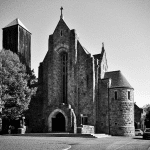The Church of England has finally announced its proposals to their General Synod to deal with the vexed question of how to respond to same-sex marriage. The presentation was led by the Archbishops of Canterbury and York, Eton-educated Justin Welby and Stephen Cottrell, who together are seeking to lead the Church of England through these difficult times.
For the last six years the Church of England has been going through a process of discussion called “Living in Love and Faith” in order to get to this moment.
In a press release issued while Australia slept, the House of Bishops outlined the legislation they will propose to the upcoming General Synod.
So what are the plans, what do they mean, and what effect will they have on the wider Anglican Communion—especially here in Australia?
The House of Bishops’ proposals contain the following specific points:
- An Apology “to LGBTQI+ people for ‘rejection exclusion and hostility’ they have faced in churches and the impact this has had on their lives.” This will be made by the House of Bishops later this week independent of the General Synod.
- No change to the official doctrine of marriage in the Church of England. It remains as understanding that marriage is between a man and a woman and, importantly, the Church of England would still not be able to solemnise marriages between same-sex couples.
- The provision of services of blessings for those who have entered into same-sex marriages.
- A change to the pastoral guidelines for clergy – those in same-sex relationships would no longer be required to be celibate. This would involve the revocation of an earlier 1991 statement by the Bishops entitled “Issues in Human Sexuality.”
So what to make of it all?
There are a few elements that we ought to receive with gladness, if only they weren’t hopelessly compromised. The apology is surely necessary. It is quite obvious that there have been many occasions when people of different views and behaviours have been met with “rejection exclusion and hostility”. This should always be apologised for. But the problem with the proposed apology here is the wrapping that it comes with. Along with the apology, the bishops will urge all congregations in their care to welcome same-sex couples “unreservedly and joyfully” as they reaffirm their commitment to a …
… radical new Christian inclusion founded in Scripture, in reason, in tradition, in theology and the Christian faith as the Church of England has received it—based on good, healthy, flourishing relationships, and in a proper 21st Century understanding of being human and of being sexual.
“Radical new Christian inclusion” allied with “a proper 21st Century understanding of … being sexual”. Just what does that mean when applied to the key question of the hour? Is same-sex activity sinful or something to be blessed? If the package being presented here is now fully and unreservedly approving of same-sex activity then it should be understood that the apology for “rejection” must include that the church previously did not approve of such actions.
While the doctrine of marriage has not officially changed it has in practice … it will make nobody happy.
And we soon discover that this is exactly what has happened. So while the doctrine of marriage has not officially changed it has in practice, since the next proposal is to provide blessings for couples in same-sex marriages. It seems almost a wilful obfuscation to with the one breath say “marriage has not changed” and then with the next speak a word of blessing about the very relationship which you have just said lies outside the bounds of marriage.
The irony is that it will make nobody happy. Conservatives can already see right through this. Either same-sex unions are sinful or they are not. There is no middle ground. If we seek to bless them then we have essentially changed our doctrine of marriage. And the revisionists also see exactly what is going on. They are outraged that same-sex unions are still not seen as the equivalent to marriage. They have been offered a “lesser” provision for something that they think is exactly the same.
Consistent with all of this is the change in pastoral guidelines for clergy. Same-sex relationships and same-sex activity are now A-OK. This must be the case if the church is choosing to bless such relationships.
Again, this package is going to please no one. It is internally-contradictory and attempts the impossible task of holding two diametrically opposed positions together. Worse, for the orthodox, it crosses that very important line in the sand by seeking to bless that which God has pronounced as cursed. It pronounces as righteous things that Scripture says are unrighteous. And it brings it all now to a head.
For both sides this is a gospel issue. For the revisionist gospel of “inclusion”, it is a disappointment. Expect to see the language of “second-class” etc. being used. In their paradigm this is exactly what is going on. But for the orthodox, as we open our Bibles, this also ought to grieve us. Jesus’ gospel call is “repent and believe the gospel”. The Church of England’s move is a complete rejection of Jesus’ call. It fully removes the call to repent of those things that God warns can lead to exclusion from the Kingdom. It also further undermines the wonderful gospel picture we have in marriage, portrayed across the whole span of the Scriptures. And it subverts that gospel more by replacing it with a false gospel of inclusion wrapped up in a non-descript “love” that is a million miles away from what is intended. Church Society’s Lee Gatiss has already pointed out just how egregious the usage of 1 John 4:16 is in the press release and more broadly in the whole approach being pursued here.
The Church of England’s move is a complete rejection of Jesus’ call. It fully removes the call to repent of those things that God warns can lead to exclusion from the Kingdom.
For the wider Anglican Communion, it may very well be another major fracturing moment. The Archbishop of Canterbury, still the titular head of the Communion, says of the proposal:
This response reflects the diversity of views in the Church of England on questions of sexuality, relationships and marriage – I rejoice in that diversity and I welcome this way of reflecting it in the life of our church.
But how is that going to persuade anyone? Every organisation has a diversity of views within it. The task of any organisation is to set clear boundaries despite that diversity, not simply expand its borders to encompass all and thus dilute its sense of self. But here now Welby “rejoices” in both the blessing of sin and the mental incongruence of affirming two contradictory things. It’s hard to see how this will do anything to repair the already very torn global fellowship.
Here in Australia the decision has little direct effect on the Anglican Church. We are self-governing and have already started to move towards our own settlement on these isssues. What it will do, however, is encourage the revisionists since the proposed solution (both affirming marriage and yet also blessing those things that aren’t marriage but claim to be) is quite similar to the position that we find ourselves in. Revisionist bishops here weren’t waiting on Lambeth Palace to make their move; they’re already well out of the blocks.
One of my dad’s favourite desserts was the Eton Mess. With a source like Eton you’d reckon that it would be a sophisticated recipe worthy of a finale episode on Masterchef. The educational pedigree of England’s finest school would surely produce something worthy of serving at the finest and most distinguished of tables.
Anglicans have been serving up fudge for years, blending up different ingredients in the vain hope of offering everyone a little of what they want.
But no. Eton Mess is nothing of those things. It’s a bowl full of broken bits of meringue, fruit and topped off with cream. If at this point you’re thinking that sounds awfully like what you did with your pavlova last year when you dropped it on the floor and rescued those bits not red-carded by the five second rule, then you would be absolutely correct. Eton Mess is, at its heart, a failed Pavlova dressed up in a fancy bowl and passed off as something worthy. It is the next generation of that other famous Anglican sweet; the fudge. Anglicans have been serving up fudge for years, blending up different ingredients in the vain hope of offering everyone a little of what they want and therefore keeping everyone at the dinner table as they chat over their coffee. The difference with the Mess is that the pretence is more brazen; just cover everything with cream from a can, describe it as a pudding and dare people to point out what went on as they get a sugar rush from the bits that they might like.
That’s what we have here now: a complete Mess that fools nobody. It has already been rejected by major players on both sides of the argument. It now goes to the General Synod of the Church of England. There is talk of it being rejected because it does not go far enough for the revisionists. They may very well bring their own proposals or we could see bishops acting on their own in their dioceses. What is certain is that the Church of England’s bishops (let alone the church as a whole) appear to have no desire to pull back from this disastrous slide away from orthodoxy. At the time of writing I know of no conservative diocesan bishop in England who has spoken out against this proposal and the supposedly evangelical Welby is loudly in favour of it, while a number of revisionist bishops have already gone public in the past few weeks on their desire to change the doctrine of marriage.
If the orthodox are looking for clear leadership now they will have to go elsewhere. That will be difficult, but many might see it as the only option now to get out of the mess.















